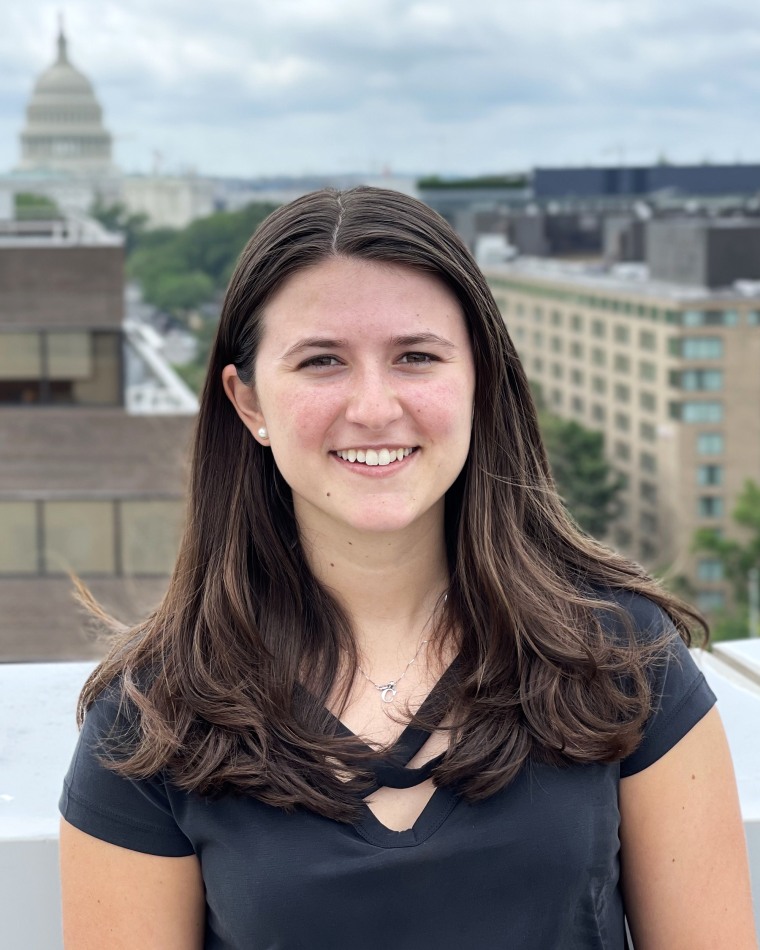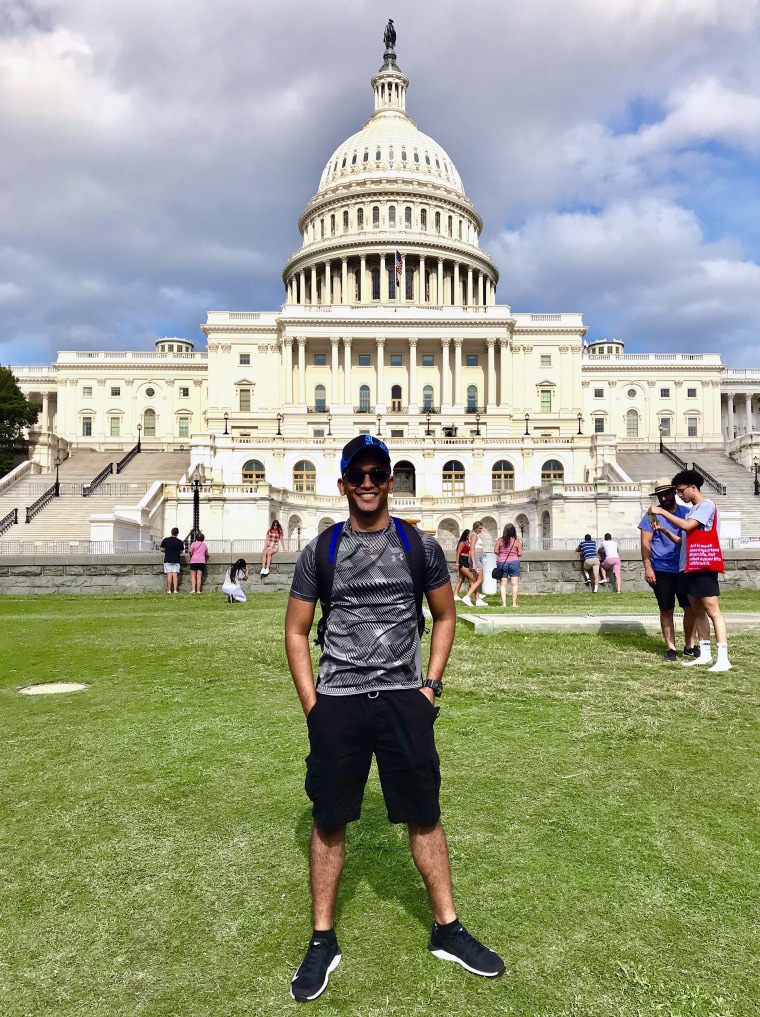WASHINGTON — Lázaro Bosch is a recent college graduate doing an internship with NASA — an opportunity that wouldn’t have been possible if it didn't include a paycheck.
"Not only did a paid internship allow me to relocate to D.C., but also not turn down the internship — if I wouldn’t be getting paid, there is no way I would have been able to take it, as I wouldn’t have been able to support myself and my family," said Bosch, 22, who grew up in Miami and helps his mother financially.

Thursday is National Intern Day. The group Pay Our Interns, which was founded five years ago by two former unpaid interns of color with the goal of eliminating unpaid internships, sent a letter asking Labor Secretary Marty Walsh for changes that would boost the number of young people who would get paid while gaining experience.
The letter, which Pay Our Interns co-founder Carlos Mark Vera shared with NBC News, asked the Labor Department not only to pay its interns but also, among other things, to eliminate an exemption to the Fair Labor Standards Act that classifies unpaid workers as “volunteers” not eligible for protection afforded to paid workers. The act sets rules about minimum wage and overtime, among other considerations.
“In the case of unpaid interns, if you’re not paid, you’re not an employee, so you’re not covered by any of those worker protections,” said Vera, who said the group is also asking the Labor Department and its Bureau of Labor Statistics to track and collect data about interns and internships.
Some federal agencies offer paid internships, but many others, including the Labor Department, don't.
Pay Our Interns, which was founded in 2016, has called for the Biden administration to include paid internships in the White House and all federal agencies as part of its budget request.
'Don't have the resources to do this otherwise'
Bosch, who hopes to get a permanent position in science communications in Washington, considers himself lucky to have found a furnished basement apartment in Washington’s tony Georgetown neighborhood, where he helps out his landlord by housesitting and doing chores in exchange for lopping money off his $1,400 monthly rent. “I don’t have the resources to do this otherwise, so I’m real happy I’m getting paid,” he said.
Bosch, who grew up in a Miami-area trailer park, said money is so tight that when he got the internship, his family scraped together just enough to rent a truck to drive him to Washington. “We budgeted for one night at a hotel and we packed our own food and drove for 14 straight hours to get here,” he said.
Amanda Pérez, 21, is a paid intern in Washington, using her mechanical engineering major to work on physical security issues with buildings and other structures for the federal government.

“This is an amazing opportunity — I learn something new every day,” she said. Like Bosch, Pérez said she probably wouldn’t be interning for the second time with the federal government if she weren’t getting paid.
“It’s unfortunate, because I know a lot of people who aren’t getting paid, and Washington is very expensive. I think just because you’re an intern doesn’t mean you shouldn’t get paid. This is work.”
Limited opportunities, less diversity
A recent study by the National Association of Colleges and Employers found that students of color are less likely to have paid internships. Researchers surveyed more than 22,000 students from 470 colleges and universities in their 2019 Student Survey Report and found that just 10 percent of all graduating Latino seniors have had internships, compared to 71 percent of non-Hispanic white students. The study also found that 10.2 percent of Latinos are in unpaid internships.
“Unpaid internships leave out those students who economically can’t pay their own way — it's deepening economic inequality," Vera said.
The study also found that among those who have paid internships, 79 percent are non-Hispanic white students, while just 8 percent are Latinos. First-generation students make up 22 percent of the students surveyed and just 19 percent of paid interns. In addition, Latino students in the class of 2019 were more likely than any other group to have had no internships by the time they graduated.
Some places offer college credit in lieu of stipends. But Pay Our Interns and other advocates say that is problematic, because not only are they asking students to pay to work, but it's also unworkable for students who can't afford to take on more tuition debt.
Eric Feldman, associate director of the Washington office of Florida International University, said paid internships are vital because in the absence of financial support, the candidate pool will be limited to those who either have the financial resources to forgo the income or end up taking on crippling debt for the experience.
FIU, which has an extensive program to help place students in internships, said the lack of paid internships among students of color has long-term repercussions for the corporate world, as well as for government policy.
"This has negative impacts on diversity and inclusion for the organization hiring the interns and for the future employability of candidates who cannot find the means to apply," he said.
"Aside from the corporate world," Feldman added, "with the important policy work done in Washington, it is vitally important that, just as elected representatives are from around the country, that lower-level interns and staff have perspective of how policies being discussed in the D.C. workplace affect their communities back home.”
Tracking internships, a call for more protections
Vera also urges the Labor Department and the Bureau of Labor Statistics to track and release more data about paid and unpaid internships across all industries and sectors.
Vera said in his letter that current laws extend only to those categorized as “employees” under Labor Department definitions. Even though interns have the right to file anonymous complaints against their employers and ask for back wages, he cited a yearlong investigation that found that the Labor Department investigated only 11 intern complaints from 2011 to 2014. Interns are reluctant to file complaints with the agency because “many individuals view unpaid internships as a way to get their foot in the door," Vera said.
The Pay Our Interns effort includes a petition that has garnered over 26,000 signatures demanding that the Labor Department “crack down” on unpaid internships.
Pay Our Interns has successfully lobbied for paid internships on Capitol Hill. Aside from lobbying for more paid internships in the White House and federal agencies, it's expanding its efforts on the state level and to the nonprofit sector.
Along with asking for collection of internship data and paid internships at the Labor Department, the group is asking the Labor Department to establish an Internship Task Force to study and prevent exploitive internship practices, and it is calling for the elimination of Trump administration-era rules that made it easier for for-profit employers to employ unpaid interns.
Pay Our Interns is also asking for the elimination of the Fair Labor Standards Act exemption for nonprofit organizations.
“Some of these nonprofits have budgets of tens of millions of dollars, and they don’t pay their interns. We’re focusing on those bigger ones, because they set the tone for the rest of the nonprofit sector," Vera said.
“Some of these major places ask you to pay for everything for the ‘privilege’ of working there, including the requirement to have a ‘reliable car’ and pay for your gas," Vera said. Some ask interns to pay membership dues.
"Some of their major nonprofits pay their CEO extremely well, and then they expect interns to not get paid. They have the money," he said.

One of those unpaid interns is FIU graduate student Joshua Naraine, who is interning with a nonprofit Washington-based think tank. He hopes to work as a researcher or an intelligence analyst in security issues one day.
“If I were to do it over, I wouldn’t have done it without getting paid,” Naraine said. He has had some help from his parents and scholarship funds from his university to pay for living and working in Washington.
“Universities should do surveys of their students at the end of their programs asking them how much did you really spend. What were the real costs for you? They give us estimated costs beforehand, but I could show you my credit card statements, and you’d be surprised to see how much I have really spent," Naraine said. He added that future interns should have more than just an estimate.
Like Bosch and Pérez, Naraine said he has enjoyed his time in Washington and has learned a lot in his internship, “but it would have been much better to get paid.”
Follow NBC Latino on Facebook, Twitter and Instagram.